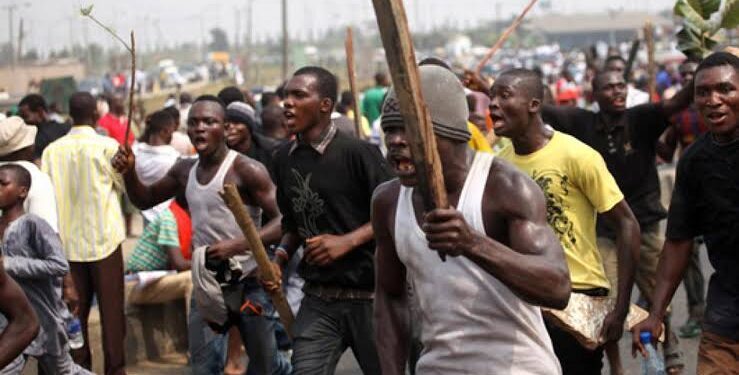Stakeholders have expressed worry over the spate of mob killings, saying it posed threats to national security.
Stakeholders, who spoke in separate interviews on Sunday in Lagos, described the increasing act as “disturbing.”
Mob justice or jungle justice is the act of individuals taking the law into their own hands by meting out punishment to alleged offenders without due process.
It is mostly targeted at those accused of theft, where the alleged criminal is publicly humiliated, tortured, stoned, beaten or lynched.
In the past six weeks, the country has recorded several cases of mob killings.
On October 1, a man identified as Monday was beaten to death in Lagos state over alleged cable theft. The mob used copper wire to tie his neck, strangling him to death.
Also, on October 13, in the Agenebode area of Edo, a mob attacked a police station, burnt to death some suspects accused of terrorising the community, and set ablaze the police barracks, patrol vans and the Divisional Police Station.
A mob killed a suspect on October 14 for allegedly stealing a motorcycle at Dei-Dei in Abuja.
On November 2, a man, Sefilahi Danlami, 19, was lynched over alleged theft at the Panteka Market in the Mpape, Abuja.
On October 18, in the Issele-Uku area of Delta, a mob hijacked two suspected motorcycle thieves from the custody of police and lynched them; the same day, in the Sagamu area of Ogun, a mob killed a man, John Udoh, 22, for allegedly stealing a motorcycle.
An assistant superintendent of police, Augustine Osupayi, 46, was killed on October 19 by a mob in the Agege area of Lagos while trying to rescue a driver accused of hitting a motorcyclist.
The mob, unhappy with his intervention, lynched him.
On November 6, a suspected thief was mobbed to death after allegedly attempting to steal from a church at the Modern Market in Makurdi, Benue.
Similarly, on November 9, a suspected burglar was macheted to death by a mob while attempting to commit a crime at Olu-Obasanjo Road in Port Harcourt.
A legal practitioner, Emmanuel Ajayi, said there was a need to prioritise human life.
“The Nigerian Constitution provides for the right to life, and it is declared that nobody’s life should be taken. Section 315 of the Criminal Code Act says that any person who unlawfully kills another is guilty of an offence called murder,” he said.
He blamed illiteracy, unemployment, poverty, religion, and lack of confidence in the police and judicial system, among others, for the rise.
“People lynched because they think that when suspects are handed over to the police or taken to court, they may buy their freedom and return to society to continue their atrocities.
“But there is no justification for mob action. No amount of loss of trust in the police or judiciary should make people take the law into their own hands. Due process must be followed before somebody can be pronounced guilty. This is necessary because a lot of innocent people have lost their lives to jungle justice,” he said.
Mr Ajayi urged the government to take responsibility for protecting lives and property. He said the government should also reform the police judiciary and create employment.
Police spokesman ACP Olumuyiwa Adejobi decried the rising incidents of mob justice. He cautioned Nigerians against its consequences on criminal justice administration, rule of law and global reputation.
Mr Adejobi, in a statement on October 20 in Abuja, condemned the country’s jungle justice trend, describing it as “a deplorable and savage behaviour.”
He said the act had led to the tragic loss of lives and destruction of property across the country.
He said that the inhuman act was a betrayal of justice and due process, undermining the rule of law, fundamental principles and ideals of human rights and justice.
(NAN)






